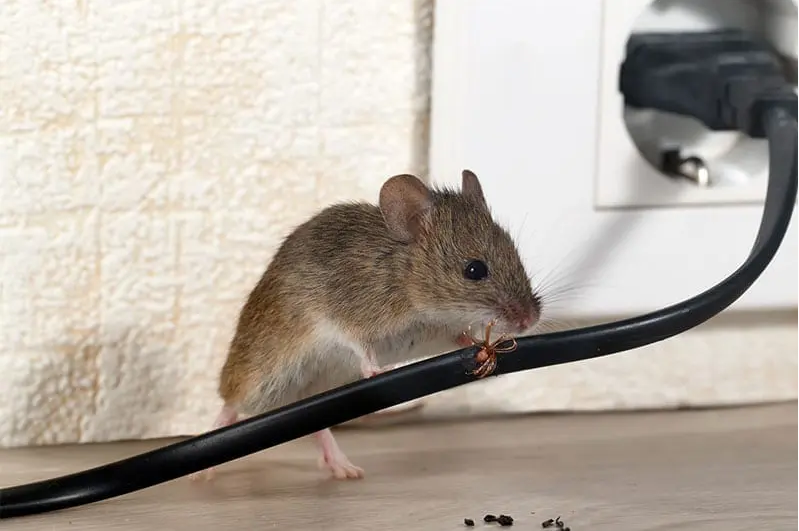Rat Prevention – How to Deter Rats from Invading Your Home

Not only being bothersome intruders, rats may seriously damage your home, yard, and even your health.
If you let them, these rodents will surely ruin furniture, structural beams, and electrical lines. On top of that, they can also spread various diseases. Understandably, nobody wants to get up to see scurrying feet or droppings in the kitchen—or really anywhere in the house.
Though incredibly intelligent creatures, you can surely outsmart them with the right strategies. Luckily, that’s today’s topic below. Ready to arm yourself with some quite effective rat control techniques? Let’s start straight away.
Why rats are attracted to your home
First of all, knowing why rats find your residence appealing enables you to determine how best to keep them away. Extremely adaptable, rats will settle where they find food, water, and cover. These three factors make any house or garden ideal for rat habitats.
Food sources
Rats have no particular food preferences. They will consume leftovers, pet food, fruit, bird food, and even garbage with great satisfaction. If food is readily available in the house (left on the kitchen counter, for example), you are essentially inviting them to a feast.
Rats have a keen sense of smell and, shockingly or not, can detect food from a vast distance. Rats can find food almost anywhere, from badly wrapped cabinet products to crumbs on the floor. Even fruit trees in outdoor gardens or compost piles could be a feast for rats.
Shelter
Even if they cause chaos in our lives, rats actually prefer to nest in quiet, peaceful surroundings.
They look for locations free from disturbance, like basements, attics, and storage rooms. Perfect hideouts can come from even outside areas like overgrown shrubs, wood piles, or garden sheds.
Once they have a warm, safe home, they will begin to reproduce, and pretty soon, you will have an infestation right on hand.
Water access
Rats are attracted to areas where they can access water, whether that means open water containers, a leaking tap, or even pipe condensation. Like any other species, they must remain hydrated. Therefore, if your house has quick access to water, it becomes a top target.
Eliminate food sources
When it comes to rat control, cutting off their food supply is a big step ahead in the battle against them. Without access to food, rats are less likely to hang around. But in addition to keeping your pantry clean, you can also:
Secure garbage bins
Rats are infamous scavengers, meaning if your garbage bin isn’t tightly secured, it could be an all-you-can-eat feast. If you reside in an area likely to have rat infestations, always put tightly fitting lids on dumpsters and think about purchasing rodent-proof garbage containers.
Store food properly
Keep everything, including pet food, in airtight containers. Rats can chew through plastic bags and cardboard boxes, so it is essential to use metal or robust plastic containers. You should not leave food out overnight in your garage, kitchen, or yard.
Clean up after meals
Especially after a demanding day, it’s easy to let crumbs lie by the side; nonetheless, cleaning after meals is really essential to prevent rodents. Clean counters, sweep the floor and try not to let dirty dishes linger in the washbasin for too long.
Rats can even be enticed to the smallest of food bits.
Seal entry points
Rats are experts invading places they shouldn’t be in. They chew their way through weak materials and squeeze through gaps as little as a cent to create their own entrance sites. Rat prevention depends on closing any possible entrance since this helps to reduce the problem.
Inspect and repair holes
Look for cracks or breaches in the floors, walls, and foundation of your house. Pay very close attention to places near windows, vents, and pipes because rats sometimes find their way through there.
Metal mesh or steel wool will help to block these gaps as rats can chew through softer materials like plastic or wood. You might also fix gaps and cracks with cement or caulk.
Reinforce door and window seals
Rats can squeeze through startlingly small holes under doors or through poorly sealed windows.
Install door sweeps to cover any gaps at the bottom and ensure that every door has suitable weather stripping. Check also that every window closes tightly and that any damaged seals are corrected straight away.
Remove potential nesting sites
It’s time to address possible nesting sites once you have shut access points and cut off food supplies. Rats adore snug, secret areas free from disturbance where they can nest. By eliminating them, your house will be less appealing to them.
Declutter indoor spaces
That includes boxes, worn furniture, and other unneeded goods that are usually numerable in basements, garages, and storage spaces. These give rats an ideal cover. Clear or arrange these spaces to minimise hiding places.
Store goods in sealed containers and, wherever you can, keep everything off the floor.
Tidy up your garden
Rats can nest in your garden; they do not only live indoors, as some people might guess. Perfect nesting spots for them are overgrown shrubs, piles of wood, or messy compost heaps.
Trim back plants often. Moreover, relocate wood piles away from the home. Lastly, make sure compost piles are sealed and properly maintained. Should you have fruit trees, gather any dropped fruit to discourage rat attraction.
Use rat deterrents
Sometimes, despite your best efforts, you might need some extra help in keeping rats away. Rat deterrents can provide an added layer of protection.
Natural rat repellents
The good news for people who want environmentally friendly options is that various natural rat repellents exist. Rats object to the strong scents of ammonia, eucalyptus, and peppermint oil. Mix peppermint oil with water to make a basic spray, then mist locations where you think rats might be hiding around doors, windows, and any other access points.
Rat traps
Should you already be dealing with a rat infestation, traps can be rather successful in reducing the population.
If you want a no-kill strategy, there are humane traps that let you capture and release rats.
Alternatively, conventional snap traps can also be utilised, but they should be placed under appliances or along walls where rats often pass.
Call in the pros to help
Rat control calls for more than just a do-it-yourself action sometimes. If you have a major infestation or if rats keep returning in spite of your best efforts, you should call in the experts.
While offering direction on long-term preventative initiatives, pest control companies have access to more advanced tools and methods for eradicating rats.
Even if you eradicate rats from your residence, ongoing pest control is rather important to stop their return. Professionals can locate the access points in your house, give you a solution, and provide ongoing assistance to ensure it stays rat-free.
Conclusion
Though they are formidable opponents, rats can be kept away by the correct methods of control. From cutting off their food and water supply to closing entry holes and removing nesting sites, every action you take helps guarantee your house stays free from these uninvited guests.
And never hesitate to call on a specialist for professional advice should everything else fail. Acting early can help you relax knowing that you’ve made your house unattractive for rat settlement.



Average Rating